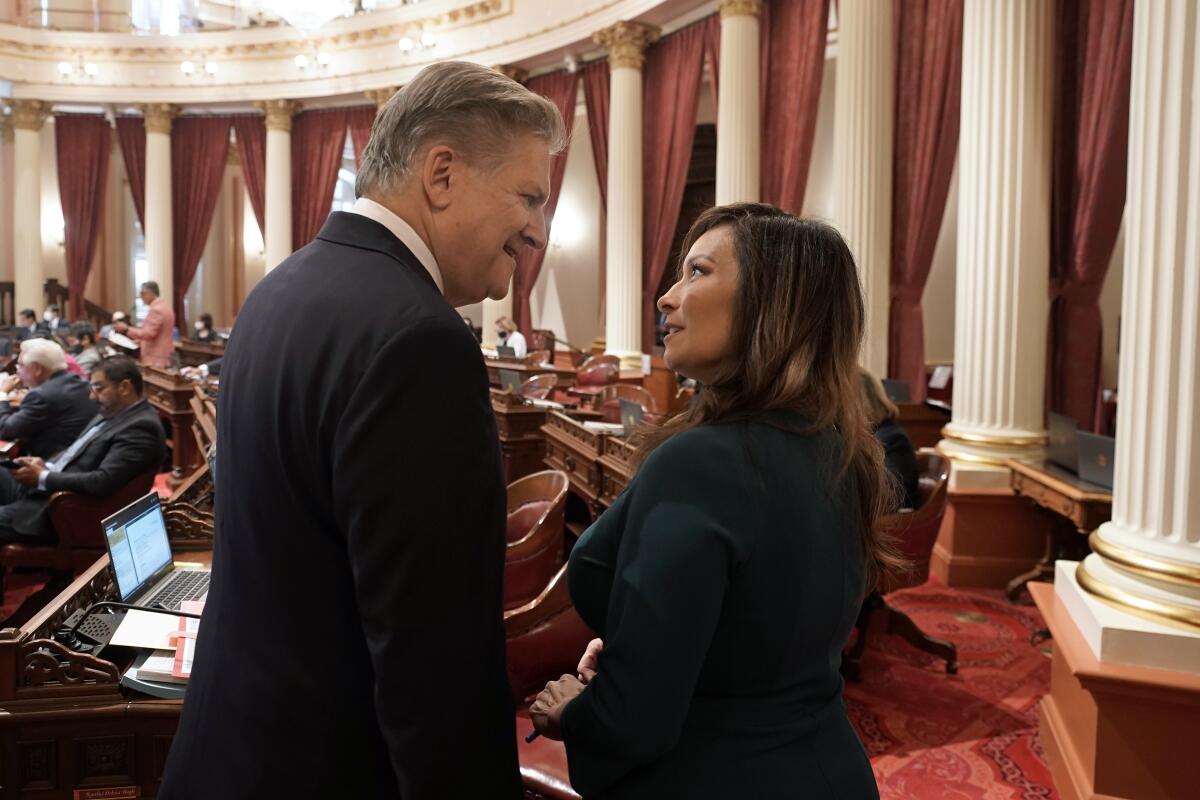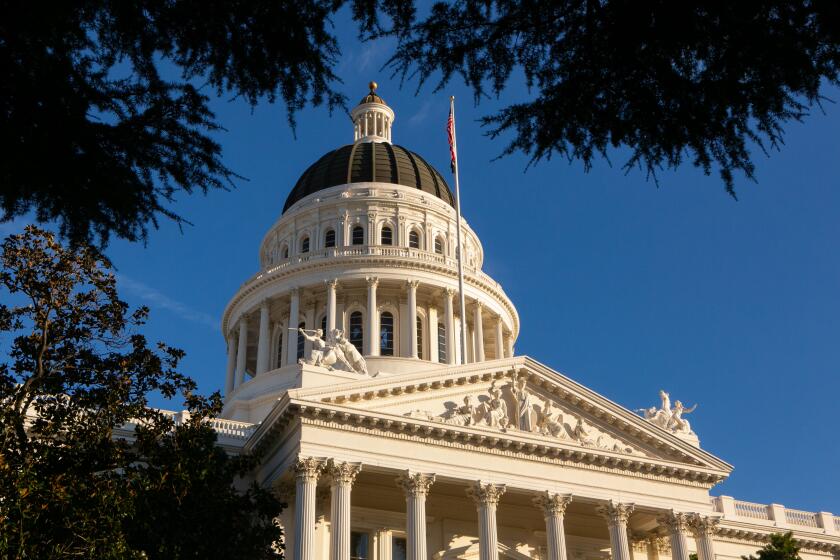Column: Amid Trump Latino gains, is it time to let Republicans into California Latino Legislative Caucus?

- Share via
- The California Latino Legislative Caucus does not admit Republicans.
- Some members wonder whether they should end the ban. Others say, “Absolutely not.”
- One Republican dismissed the all-Democrat caucus as a party crew.
Over the phone, Lena Gonzalez’s voice had the patient but proud tone of a lawyer charged with defending the damned.
Her metaphorical client: The California Latino Legislative Caucus, which the Long Beach-area state senator heads.
At 38 members strong, it’s one of the largest groups of its kind in the United States and has long served as the tip of California’s progressive spear. Members helped transform the state within a generation from a place that birthed the notorious anti-immigrant Proposition 187 into one where people without proper documentation can apply for driver’s licenses, health insurance, get in-state college tuition and more.
Then the 2024 elections happened.
Now an established force in the Legislature, the Democratic Latinos are facing pressure to refocus their priorities.
Latinos shifted toward Donald Trump nationwide in numbers that continue to make headlines and confound Democratic leaders. It happened in deep-blue California too. In the blue-collar, overwhelming Mexican Anaheim precinct where my father lives, support from Joe Biden to Kamala Harris dropped from 73% in 2020 to 60% this year. Trump nabbed 36% of the vote — though not from my father, who thinks he’s a “loco” — despite the former and future president’s promise to deport as many immigrants without proper documentation as he can.
Eight Latino Republicans now serve in the state Legislature, doubling the former record set just two years ago. Their districts span California from the border to the Sierra, the Central Valley to Orange County, as do their life stories: children of immigrants, multiethnic, multigenerational.
They make up 18% of all California Latino legislators, in a state where a survey released this year by the National Assn. of Latino Elected and Appointed Officials — headed by a Downey Latina Republican council member — found 16% of Latinos are registered as Republicans.
This new reality is why I was calling Gonzalez.
Since it started in 1973, the Latino Legislative Caucus has excluded GOP members. The ban was easy to justify, I told Gonzalez, when there were only a few raza Republicans in Sacramento and they were seen as little better than vendidos — sellouts.
But given how Latino voters shifted this election day, is it time for the caucus to roll out the red carpet for their Republican colleagues?
“That is a good question,” Gonzalez responded. “We’re obviously racking with this in our brains. This year is very different. We saw a flip in the Imperial Valley that we thought we’d get.”

She was talking about Assembly District 36, where newbie Jeff Gonzalez (no relation to Lena) triumphed over a candidate supported by the Coachella Valley Latino political machine that has dominated elected office out there for a generation.
She also mentioned the Inland Empire’s 58th Assembly District, where first-time candidate Leticia Castillo beat Clarissa Cervantes, the sister of state senator and former Latino Legislative Caucus chair Sabrina Cervantes, by just 596 votes.
“I have to talk to our caucus,” Gonzalez continued. She said some members are considering admitting Latino Republicans, while “others have said, ‘Absolutely not.’”
It’s weird times for Latino politics in California, even as Democrats still hold a supermajority in both legislative chambers, one of our U.S. senators is Pacoima native Alex Padilla and Latino caucus members Robert Rivas and Gonzalez are, respectively, speaker of the Assembly and Senate majority leader. Pundits long predicted that the template Latino Democrats created in California in the wake of Proposition 187 for electoral success — align with labor, grow government and advocate for residents without proper documentation — would spread nationwide and secure the future of the Democratic Party as this nation turns more Latino.
Now, Gonzalez admits, Latino Dems can no longer shun their GOP cousins like the weirdo branch of the family at a carne asada.
“It may not be in the caucus,” she said, “but we’re going to have to work with them in other capacities, clearly.”
Proposition 187 and battles over illegal immigration are rapidly ceasing to define a Latino electorate that is increasingly U.S.-born and concerned about the economy.
For decades, Latino Republicans have lambasted the Latino caucus for not letting them in, sparking attempts to create their own group (it went nowhere) and a state investigation into whether a partisan ethnic caucus was even legal in the first place (it was).
Now, giddily thinking about what’s next for them, the Latino Republicans I talked to have adopted the old Groucho Marx adage of not wanting to belong to a club that would have them as a member.
Abel Maldonado, a former Santa Maria Assembly member and state senator who was one of the last Republicans to hold statewide office when he served as lieutenant governor in 2010, dismissed the Latino caucus as little better than a party crew.
“It’s great to go have dinner with the caucus and have a glass of wine,” he said, half-serious and half-not. “I miss going with Fabian [Nuñez] and Antonio [Villaraigosa] and — en paz descanse [may he rest in peace] — Marco Firebaugh,” the late southeastern L.A. County Assembly member.
“It was fun to go out in nighttime,” Maldonado continued, “but during the day, their policies hurt Latinos. They’ll tell you they’re for the poor, but they fail to tell you they keep you poor.”
His advice to Republican Latinos: “Don’t be part of this caucus that caused” California’s current problems.
They talk about a lot about diversity, but they’re not interested in diversity of thought, in differing political opinions.
— Assemblymember Josh Hoover on Latino Democratic legislators
Assemblymember Josh Hoover, who represents a Sacramento-area district, said his fellow Latino GOP legislators have a text thread on which they trade ideas and wonder whether they should start their own group. (That’s what Latino Republicans did in Congress, forming the Congressional Hispanic Conference in 2003 to distinguish themselves from the heavily Democratic Congressional Hispanic Caucus.)
About a third of all California Republican legislators are now Latino. “That’s a big deal,” he said. “It shows that the Republican Party is not the party that has been painted by the left.”
Hoover said the caucus’ rejection of people like him showed “they talk about a lot about diversity, but they’re not interested in diversity of thought, in differing political opinions. That’s something that needs to change in California.”

Inland Empire Sen. Rosilicie Ochoa Bogh, the daughter of immigrants from the Mexican state of Yucatán, became California’s first Latina Republican state senator when she was elected in 2020; now, there are three. She remembered running into Latino Legislative Caucus members at a dinner her first year in office and initially being upset that she couldn’t join them.
“Like in high school when you’re not part of a group — you know how you felt like the outsider, but you felt like you belonged?” Ochoa Bogh said. “Then I thought about it and felt it wasn’t right. I thought, ‘I’m more Latina than many of these folks!’”
She acknowledged that the caucus had a good reason to form 51 years ago “because they probably felt they didn’t have a voice then.” Now, Latinos make up a plurality of Californians — and Ochoa Bogh argued that an ethnic caucus makes no sense.
“I think California, as a whole in this election, really conveyed a strong message that they’re done with creating all of these segments instead of uniting us all together,” she said. “Besides, if the Latino population aren’t getting their needs met right now, it’s Latino Democrats in charge, not the Republicans.”
In final tallies of the 2024 presidential election, Downey and other largely Latino working-class cities in Southeast L.A. County saw big shifts in support of Trump.
The odds of the Latino caucus reexamining its Democrats-only rules shrank dramatically, however, after the special session called by Gov. Gavin Newsom this month to prepare California for an expected onslaught of Trump legal actions against the state.
On the first day, Sen. Marie Alvarado-Gil — a former caucus member who switched her party registration last year from Democrat to Republican — took to social media to call Gonzalez “the grand wizard of the Latino KLAUCUS” after Alvarado-Gil claimed Gonzalez tried to kick her out of a break room.
Gonzalez declined to discuss the matter. “We have work to do, and I don’t want us to be distracted by what someone said to someone else,” said Gonzalez of Alvarado-Gil, whose office didn’t respond to a request for comment.
Democrats eventually passed a bill that would set aside a $25-million anti-Trump legal fund, including protecting undocumented residents.
“One thing that we [the Latino caucus] stand united for is against mass deportation,” said Gonzalez, who just introduced a bill that would establish a state agency to help immigrants and refugees. “Not one Republican supported the bill.” It’s hard to endorse caucus membership, she said, for those unwilling to support “a very basic value of the Latino caucus.”
When I pointed out that anti-immigrant sentiment among Latinos in California is higher than ever before and maybe her Latino Republican colleagues were onto something, Gonzalez cut right to the proverbial point.
“We’ve got a lot to work on ourselves, but we got to work on ourselves before letting them in.”
More to Read
Sign up for Essential California
The most important California stories and recommendations in your inbox every morning.
You may occasionally receive promotional content from the Los Angeles Times.














